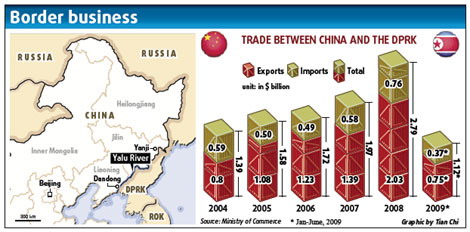
|
CHINA> National
 |
|
Related
Bridge over troubled water...
By Li Xiaokun,Wang Huazhong (China Daily)
Updated: 2009-08-05 08:18 Recent figures from the Ministry of Commerce showed China's trade with the reclusive nation had surged 40 percent from $192 million in May to $269 million in June. However, Zhang Baoren, an expert on the Korean Peninsula economy with Jilin University, said the figures covered various kinds of trade, including Beijing's aid to Pyongyang, and did not reflect the real picture of the situation in border cities.
"China controls the lifeline to the DPRK as 90 percent of crude oil and 80 percent of commodities there come from China," said an article in Japan's Yomiuri Shimbun newspaper recently, while media in ROK reported that Pyongyang's reliance on trade with Beijing increased from 32 percent in 2003 to 73 percent last year, largely due to a deterioration in relations between the DPRK and Seoul after the hardline Lee Myung-bak administration took power. This has left some analysts scratching their heads over the subsequent drop off in trade with China, with some blaming the nuclear test and 18 missile launches it has carried out since April, which military staff in the ROK estimated cost their northern neighbors a cool $700 million. Dandong businessman Shan disagreed. According to the United States' Institute for Foreign Policy Analysis, the DPRK's gross domestic product stands at $17 billion. The White House has also claimed Pyongyang has raised funds by selling nuclear technology abroad, although there are no exact figures for the alleged deals. "The DPRK can afford $700 million," said Shan. "The DPRK is saving money for extreme circumstances, such as a war or domestic turmoil, given the huge pressure exerted by the international community, the unstable health of the nation's leader Kim Jong-il and a possible power transfer, maybe to his third son Kim Jong-un. "These complex factors have made Pyongyang more cautious with its money compared to after the 2006 nuclear test," he said. The Los Angeles Times reported on July 5 that the DPRK was taking a "great leap backward" to restrict its commodities economy, which it has been developing for the past decade. It said some items of food, clothing and even pharmaceuticals imported from China were banned in its markets, with local traders now stocking only 35 percent of the merchandise previously available. Liu Jiangyong, one of China's leading experts on Northeast Asian studies with Tsinghua University in Beijing, however, believes the opposite is true and said the DPRK was actually looking to boost its commercial economy. "The nation's first television commercial, one for Taedong Beer, was broadcast on July 3 and is as a signal they want to follow China's way of economic reform," he said. "The reduction in trade is largely due to the tight control Pyongyang has placed on its border with China since May." Liu said reasons behind the tightened border controls are the uncertainty surrounding the DPRK's political situation, which has been exacerbated by Kim Jong-il's suspected ill health and fears of information leakage. "In this unstable political situation, the DPRK leadership wants to consolidate its domestic political control, keeping a tight lid on contact with foreign countries and people," said Yongwook Ryu, a ROK-born Northeast Asian studies specialist with Harvard University in the US. "Politics comes before economics in the DPRK right now, and they will do things even if doing so would hurt their economy." Many businessmen and women involved in DPRK trade in Dandong told China Daily they were pessimistic about the future, but Shan insisted he was upbeat. "I'm a native of Dandong and, based on my experience, the strained situation will last for no more than three months," he said. "And, to tell you the truth, as border merchants we don't fear war, which will bring even greater opportunities. "What does concern me is the domestic situation over there. The power shift will definitely affect trade." He is not alone in his fears and experts have suggested there is now a subtle balance between legitimate trade and smuggling in the border cities. "Keeping the trade flowing between the duo is the only choice for the DPRK," said Lu Chao, director of DPRK study center of Liaoning Provincial Academy of Social Sciences. "It is a basic prerequisite to develop and participate in world trade." Ryu at Havard University added: "Both countries see lots of benefit in bilateral trade but the speed of the resumption depends on how fast it takes for the DPRK regime to become politically stable. If they feel they have a firm grip on power, and if the leadership issue is settled, then they will start engaging with the outside world strategically as before."

|